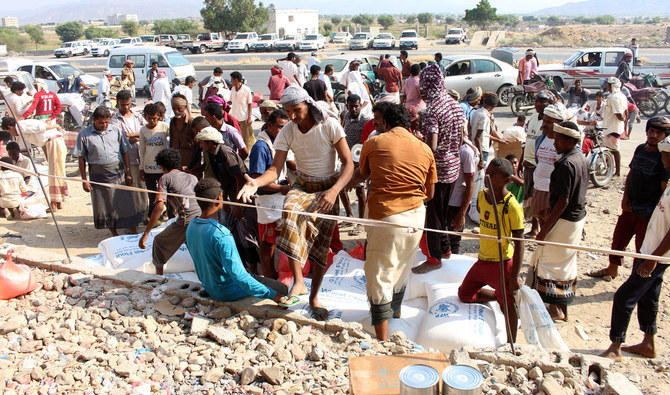NEW YORK: The UN on Wednesday welcomed the resumption of commercial flights from Sanaa airport in Yemen to Egypt. But Stephane Dujarric, the spokesperson for Secretary-General Antonio Guterres, warned that the humanitarian situation in the war-ravaged country remains dire, as he called on donors “to pledge and to convert the pledges into cash.”
The first flight to Cairo, under the terms of a UN-brokered two-month truce, took off on Wednesday morning. It was the seventh international flight overall to depart from Sanaa during the truce, which is due to expire on June 2. Intensive efforts by Hans Grundberg, the secretary-general’s envoy for Yemen, continue as he attempts to persuade all sides to extend it. Dujarric described the preliminary signs from the truce negotiations as “positive.”
He added that so far a total of 2,495 Yemenis have flown from Sanaa to Amman in Jordan or Cairo. He thanked the Egyptian government for its “invaluable support in bringing about this important achievement,” and the Yemeni government for its “constructive role in making this possible.”
Grundberg has welcomed the resumption of flights as providing an opportunity for more Yemenis “to travel abroad to access medical care, educational and trade opportunities, and to visit family.”
However, despite the positive news about the return of air travel and some humanitarian improvements during the two months of the truce, Dujarric warned that the overall humanitarian situation in the country nevertheless remains dire.
“We must be clear that humanitarian needs in Yemen remain high,” he said during a briefing in New York.
The UN predicts that more than 19 million people in the country will go hungry this year, including more than 160,000 who face outright famine. More than four million Yemenis have been displaced during seven years of conflict.
“Severe needs persist across all sectors,” said Dujarric. Aid agencies need $4.28 billion of aid to help 17.3 million people across the country this year, he added, but only 26 percent of that amount is funded.
“This means that core programs, like food assistance, healthcare and other activities are scaling back when they should be expanding,” he said. “We urge donors to pledge, and to convert pledges to cash.”
Meanwhile, efforts by the UN to raise $144 million to inspect and carry out work on the decaying oil tanker Safer continue amid ongoing Houthi intransigence over attempts by UN experts to board the vessel and inspect it.
The Safer, a floating storage and offloading terminal that contains 48 million gallons of oil, has been anchored in the Red Sea close to the port of Hodeidah since the start of the war more than seven years ago. The condition of the vessel continues to deteriorate as little no maintenance has been carried out during that time.
“This is not an operation that can be done in a half measure,” said Dujarric when asked to comment on the cost of the operation required to make it safe and prevent a potentially catastrophic oil spill.
“We need to have the money to hire the technical team, to hire the specialists that can do this and can do it safely.”
He added: “It’s kind of like doing renovation in your apartment in New York. The longer you wait, the higher the costs.
“So we’ve been talking about this for a long time; it probably could have been done with less money a few years ago. The costs are higher (now). We see the inflation all over the world.”
















